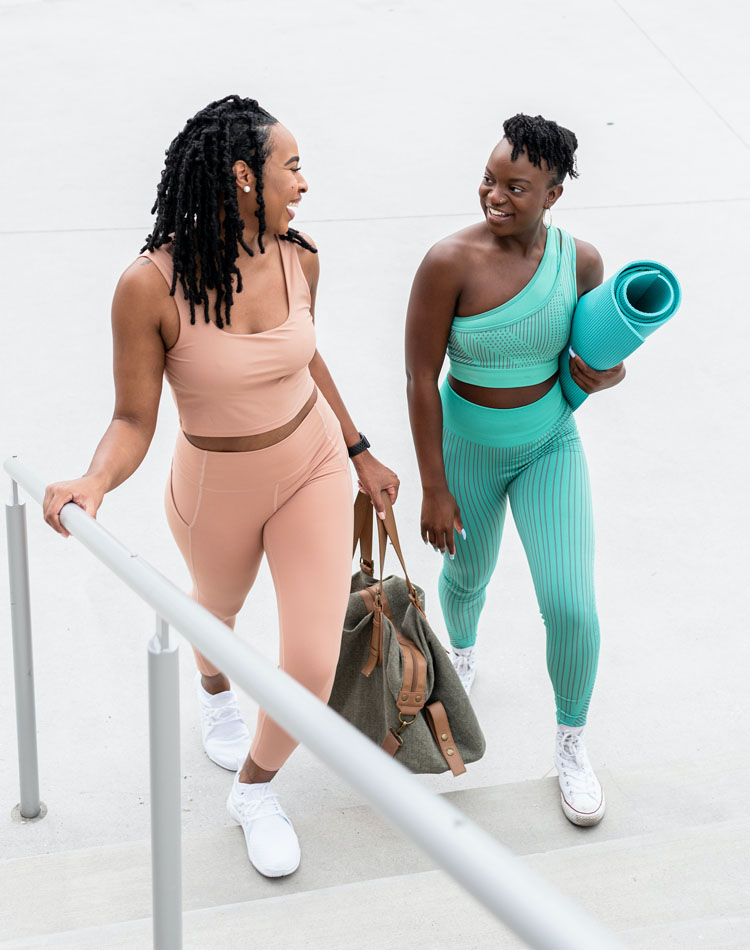
Making friends when we’re kids can be as simple as sharing a toy or deciding that we’re suddenly “best friends.” But the older we get, the significantly less straightforward it becomes and the more friendship changes. It’s probably been a while since many of us had to put ourselves out there; we might feel out of practice and, at the very least, a little confused about what we should actually say to someone we’d like to get to know better (are we coming off creepy? Desperate? Weird?). While there isn’t one right way to make new friends as an adult, here are six ice breakers that can help.
1. Highlight a similarity
The root of friendship is often an underlying similarity, whether it’s a shared interest, hobby, or sense of humor. That’s why pointing out something you have in common is a great way to approach someone you want to be friends with. Commenting on your shared love of camping, sushi, or rap music shows that you’re paying attention to and are interested in the other person. Plus, you can set the stage for future plans more easily when there’s something in common (“I’ve been dying to try the new hiking trail! Want to check it out together?” or “There’s a great sushi restaurant nearby if you want to go sometime!”). The key is to not force it. Avoid exaggerating and don’t try to be someone you’re not just to find something in common. Noticing and highlighting genuine similarities will not only make you both feel more comfortable, but it will also help you come across as authentic and increases the chances that the two of you will connect.

Source: @hauteofftherack
2. Ask them questions
We often think that to win people over, we have to be impressive: We have to have interesting things to say, be well informed about the topic, or be hilarious and entertaining. But the secret to winning friends and building connections is actually the opposite: Make the other person feel like they are impressive and they’ll like you. People like talking about themselves—it’s just fact. So focus on other people and genuinely care about what they have to say. Come up with thoughtful, open-ended questions (forget boring small talk).
If it’s a brand-new friendship or you’re just meeting, ask for a restaurant recommendation, a new workout class, or the best nearby cafe to work from. If it’s someone you know a little bit, focus on getting to know them better instead of stating your opinion or talking about yourself. For example, if they’re talking about balancing a career and a side hustle, ask them how hard it is or what they’re most passionate about instead of stepping in with your experience right away. Asking questions shows that you have an interest in the other person’s opinion, and feeling comfortable opening up will make them want to build a connection with you.
3. Give them a compliment
Compliments from strangers or people we don’t know well can be so powerful. Since they’re unexpected, they might even be more appreciated; one compliment to a potential new friend could be memorable enough to be the start of a strong connection. It might feel easier to compliment the things that are obvious, like physical appearance or style, but if you feel up to it, make it something a little more personal. Compliment their work ethic, creativity, or great laugh. These kinds of genuine, perceptive compliments are the ones that stick with us. Plus, moving beyond the superficial (“cute top!”) can make people feel seen and heard in ways that really foster connection and friendship. No need to go overboard and base the entire conversation around various compliments—one thoughtful compliment will come off much more genuine and lay the foundation for the conversation to flow from there.

Source: Colorjoy Stock
4. Offer help
One of the main things that separates good friends from casual acquaintances is emotional, practical, and social support. That’s why letting someone know that you’re available if they need help is a great way to approach them and subtly let them know that you’re interested in being friends. For example, if they mention that they’re moving to a new building, offer to move some boxes on moving day or help them pick out furniture. If they’re stressed about a work presentation or an exam at school, offer to drop off a coffee later or go through flashcards together. This can work especially well if you’re able to work together toward a common goal (like if you’re both training for a marathon or trying to meal prep more often). Offering tangible support or having a concrete goal for you to both help each other can form a connection and let the potential friend know that you’re trustworthy, supportive, and thoughtful.
5. Use humor
After all, what’s the point of friendships if not to have a good laugh? Humor is actually an important basis of friendships, but it’s not about knock-knock jokes or trying to show off your wit and charm (remember #2!). It actually has very little to do with impressing someone else and everything to do with trying to make both of you feel more at ease. Sharing a lighthearted joke or making a humorous comment about the situation you’re in lets the other person get a glimpse of your personality. Plus, you’ll both be able to relax and get to know each other when you’re not taking everything so seriously. Just remember that humor shouldn’t come at anyone’s expense because it might come off mean-spirited and uncomfortable instead of funny (if you ever have to say, “it was just a joke,” it wasn’t). Bottom line: Be your hilarious, fun self, and at the very least, it can be a helpful test to see whether you share the same humor or not and if you two have friendship chemistry.
6. Be upfront
While this strategy might feel the most vulnerable, it can also be the most impactful. It’s hard to put yourself out there when there’s always the possibility of rejection (yes, even with friendships). If you’ve had only brief interactions with someone you want to get to know better, it’s absolutely OK to share that you’re looking to meet new people and you’d love to get coffee, drinks, or [insert other amazingly fun friendship date here]. Being direct doesn’t have to come off as creepy or clingy. In fact, it typically comes off as confident and flattering.
To try this strategy for yourself, invite the potential friend to get together in a different context (“I really enjoyed meeting you! Do you want to grab a coffee sometime?” or “I actually just moved here and don’t really know anyone. I’d love to find a time to go for a walk together.”). The truth is that making the first move is scary in friendships, just as it is in dating, so the other person will likely be relieved that they know where you stand.
